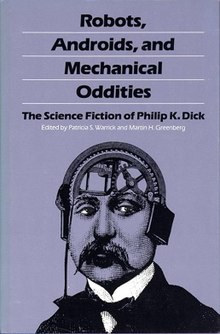
The Man in the High Castle (1962), by Philip K. Dick, is an alternative history novel wherein the Axis Powers won World War II. The story occurs in 1962, fifteen years after the end of the war in 1947, and depicts the life of several characters living under Imperial Japan or Nazi Germany as they rule a partitioned United States. The titular character is the mysterious author of a novel-within-the-novel entitled The Grasshopper Lies Heavy, a subversive alternative history of the war in which the Allied Powers are victorious.
"The Last of the Masters" is a science fiction novelette by American writer Philip K. Dick. The original manuscript of the story was received by the Scott Meredith Literary Agency on July 15, 1953, and the story was published by the Hanro Corporation in the final issue of Orbit Science Fiction in 1954. It has since been reprinted in several Philip K. Dick story collections, beginning with The Golden Man in 1980.

"If There Were No Benny Cemoli" is a science fiction short story by American writer Philip K. Dick, first published in the December, 1963 issue of Galaxy magazine with illustration by Lutjens.
Martin Harry Greenberg was an American academic and anthologist in many genres, including mysteries and horror, but especially in speculative fiction. In all, he compiled 1,298 anthologies and commissioned over 8,200 original short stories. He founded Tekno Books, a packager of more than 2000 published books. He was also a co-founder of the Sci-Fi Channel. Greenberg was also an expert in terrorism and the Middle East. He was a longtime friend, colleague and business partner of Isaac Asimov.
Robert Thurston was a science fiction author well known for his works in popular shared world settings.
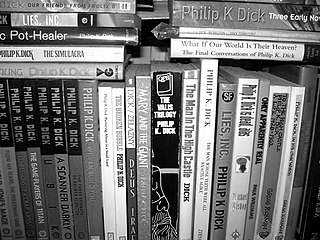
The bibliography of Philip K. Dick includes 44 novels, 121 short stories, and 14 short story collections published by American science fiction author Philip K. Dick during his lifetime.

Henry Slesar was an American author and playwright. He is famous for his use of irony and twist endings. After reading Slesar's "M Is for the Many" in Ellery Queen's Mystery Magazine, Alfred Hitchcock bought it for adaptation and they began many successful collaborations. Slesar wrote hundreds of scripts for television series and soap operas, leading TV Guide to call him "the writer with the largest audience in America."

Machines That Think is a compilation of 29 science fiction stories probing the scientific, spiritual, and moral facets of computers and robots and speculating on their future. It was edited by Isaac Asimov, Martin H. Greenberg, and Patricia S. Warrick.
"Farewell to the Master" is a science fiction short story by American writer Harry Bates. It was first published in the October 1940 issue of Astounding Science Fiction on page 58. It provided the basis of the 1951 film The Day the Earth Stood Still and its 2008 remake. In 1973, the story was adapted by Marvel Comics for its Worlds Unknown series. According to Gizmodo, the 1973 adaptation was more faithful to the original story than was the 1951 film.
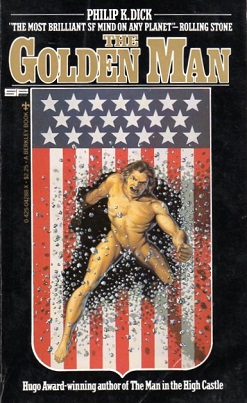
The Golden Man is a collection of science fiction stories by American writer Philip K. Dick. It was first published by Berkley Books in 1980. The stories had originally appeared in the magazines If, Galaxy Science Fiction, Beyond Fantasy Fiction, Worlds of Tomorrow, Science Fiction Stories, Orbit Science Fiction, Future, Amazing Stories and Fantasy and Science Fiction

The Collected Stories of Philip K. Dick is a collection of 118 science fiction stories by American writer Philip K. Dick. It was first published by Underwood-Miller in 1987 as a five volume set. See Philip K. Dick bibliography for information about the mass market reprints.
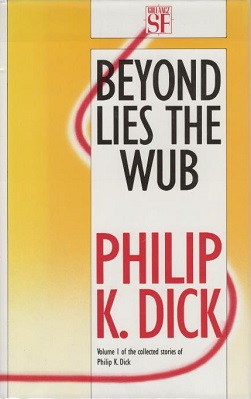
Beyond Lies the Wub is a collection of science fiction stories by American writer Philip K. Dick. It was first published by Gollancz in 1988 and later comprised Volume I of The Collected Stories of Philip K. Dick. Many of the stories had originally appeared in the magazines Fantasy and Science Fiction, Planet Stories, If, Galaxy Science Fiction, Imagination, Space Science Fiction, Fantastic Story Magazine, Amazing Stories, Future, Cosmos, Fantasy Fiction, Beyond Fantasy Fiction, Thrilling Wonder Stories, Startling Stories. The collection was reprinted by Citadel Press in 2003 under the title Paycheck and Other Classic Stories.
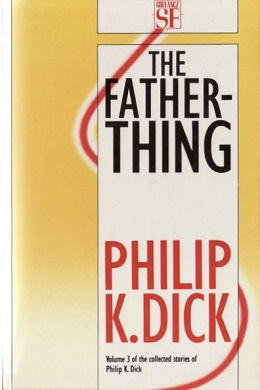
The Father-Thing is a collection of science fiction stories by American writer Philip K. Dick. It was first published by Gollancz in 1989 and reprints Volume III of The Collected Stories of Philip K. Dick. It had not previously been published as a stand-alone volume. Many of the stories had originally appeared in the magazines If, Science Fiction Adventures, Science Fiction Stories, Orbit, Fantasy and Science Fiction, Imagination, Future, Galaxy Science Fiction, Beyond Fantasy Fiction, Satellite, Science Fiction Quarterly and Imaginative Tales.
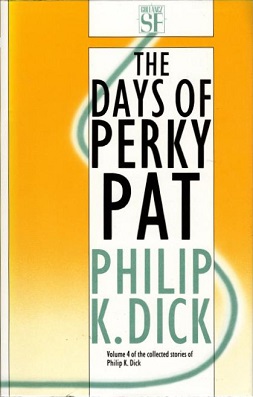
The Days of Perky Pat is a collection of science fiction stories by American writer Philip K. Dick. It was first published by Gollancz in 1990 and reprints Volume IV of The Collected Stories of Philip K. Dick. It had not previously been published as a stand-alone volume. The stories had originally appeared in the magazines Galaxy Science Fiction, Science Fiction Stories, If, Fantastic Universe, Fantasy and Science Fiction, Fantastic, Worlds of Tomorrow, Escapade and Amazing Stories.

The Little Black Box is a collection of science fiction stories by American writer Philip K. Dick. It was first published by Gollancz in 1990 and reprints Volume V of The Collected Stories of Philip K. Dick. It had not previously been published as a stand-alone volume. Many of the stories had originally appeared in the magazines Worlds of Tomorrow, Galaxy Science Fiction, Amazing Stories, Fantasy and Science Fiction, Famous Science Fiction, Niekas, Rolling Stone College Papers, Interzone, Playboy, Omni and The Yuba City High Times.
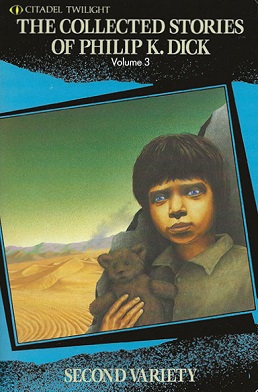
Second Variety is a collection of science fiction stories by American writer Philip K. Dick. It was first published by Citadel Twilight in 1991 and reprints Volume III of The Collected Stories of Philip K. Dick with the addition of the story "Second Variety". Many of the stories had originally appeared in the magazines If, Science Fiction Adventures, Science Fiction Stories, Orbit, Fantasy and Science Fiction, Imagination, Future, Galaxy Science Fiction, Beyond Fantasy Fiction, Satellite, Science Fiction Quarterly, Imaginative Tales and Space Science Fiction. There is huge overlap with the 1997 The Philip K. Dick Reader: stories 1–20 and 24 are identical.

The Eye of the Sibyl is a collection of science fiction stories by American writer Philip K. Dick. It was first published by Citadel Twilight in 1992 and reprints Volume V of The Collected Stories of Philip K. Dick, omitting the story "We Can Remember It for You Wholesale". Many of the stories had originally appeared in the magazines Worlds of Tomorrow, Galaxy Science Fiction, Amazing Stories, Fantasy and Science Fiction, Famous Science Fiction, Niekas, Rolling Stone College Papers, Interzone, Playboy, Omni and The Yuba City High Times.

The Philip K. Dick Reader is a collection of science fiction stories by American writer Philip K. Dick. It was first published by Citadel Twilight in 1997. Many of the stories had originally appeared in the magazines If, Science Fiction Adventures, Science Fiction Stories, Orbit, Fantasy and Science Fiction, Imagination, Future, Galaxy Science Fiction, Beyond Fantasy Fiction, Satellite, Imaginative Tales, Fantastic Universe and Space Science Fiction. It is identical in content and order to the edition of volume 3 of the Collected Stories of Philip K. Dick produced by the same publisher apart from the substitution of three stories in positions 21-23 of 24 and the omission of the end notes in the Collected Stories edition. At press time, stories 21 and 24 had already been made into successful movie adaptations and stories 22 and 23 had been optioned.
My Object All Sublime is a science fiction short story written by Robert A. Heinlein, originally printed under the pen name Lyle Monroe, in the February 1942 issue of Future magazine. Its plot follows an invisible man through his adventures.

Patricia DeEtte Scott Warrick was an American literary scholar and editor, interested in science fiction and technology. She was a professor of English at the University of Wisconsin–Oskosh, Fox Cities, from 1966 to 1996. She was president of the Science Fiction Research Association in the 1980s. She co-edited Machines That Think (1984) with Isaac Asimov and Martin H. Greenberg.
